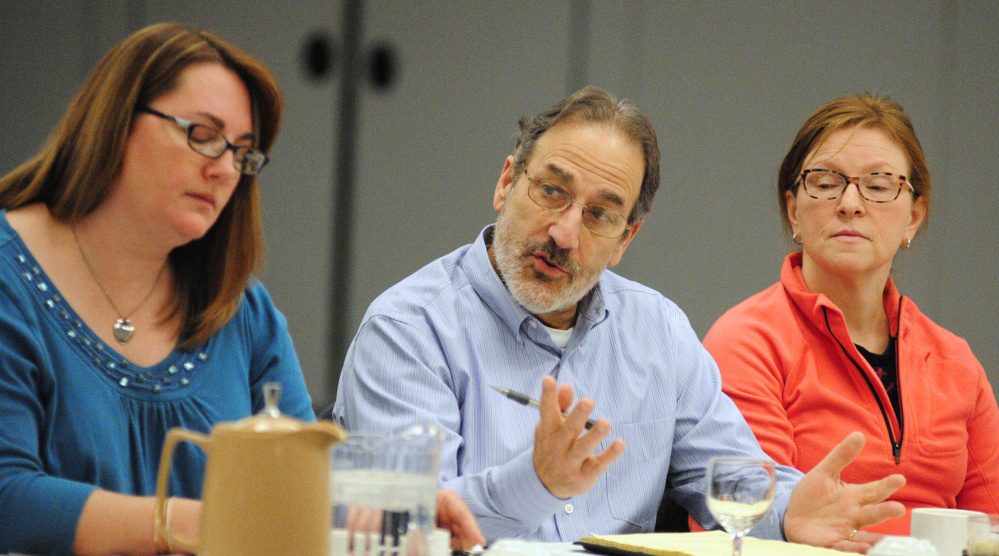AUGUSTA — Seven weeks after the $59.3 million combined city and school budget was approved, city and school officials are now pondering what to do with an unexpected additional $796,000 in state education funding.
The additional funding was approved by the Legislature as part of $48 million added to the state budget for education, following extensive state budget deliberations and a brief state government shutdown.
In general, half the money from the state is earmarked for property tax relief. So $398,000 of Augusta’s newfound money will be added to the budget as revenue, helping to reduce the property tax rate.
City Manager William Bridgeo said when other state budget changes, including a reduction in Homestead Exemption reimbursement from the state, are factored in, using half of the new state funding to reduce property taxes would result in a less than 1 percent reduction in the tax rate. When the budget was passed, it was expected to lead to a tax increase of slightly less than 3 percent.
What to do with the other half of the money, however, could be a matter for debate between city and school leaders.
When city councilors approved the combined $59.3 million city and school budget in May, they cut $444,000 from the school budget, which school board members had approved in March.
Having heard there was a chance money could be added in the state budget for education, school officials sought to have a question placed on the June ballot, when voters approved the $29.4 million school budget, asking voters to give the school board the authority to spend any additional state money Augusta received to help fund the upcoming year’s school budget.
However, city councilors balked at that request, and, instead, gave themselves the authority to decide what to do with any additional state education funding, with three options in mind: Use it to reduce taxes, allow it to be spent on school needs, or carry over the funds to help fund future years’ school budgets.
In Augusta, the City Council sets the total city and school budgets, but the school board determines how the money in the school budget is spent.
Bridgeo and Mayor David Rollins said city and school officials determined in previous discussions that if additional state funding is appropriated for schools, the school board could come to the council and seek access to that money to help fund the schools in the coming year.
“There was some discussion during the budget deliberations when you cut the school board’s (budget) request, that if additional monies came in, there would be an openness to talking to them about giving it back to them,” Bridgeo told councilors Thursday.
Schools Superintendent James Anastasio told school board members Wednesday they should meet soon to talk about what they might want to do with the money, and how best to approach the council to ask for their approval to do so.
“The board would have to ask the City Council, and the City Council would have to respond to the ask and either allow the board to use the money they ask for or not,” Anastasio said. The council “can’t determine how the money is spent (if it allows any of it to be spent). But they can determine how much money you would have access to for the current year. I do recommend the board get together as soon as possible to talk about what they want the money to be used for and how to approach the City Council, because we will be receiving $796,000 more. And that’s money that could be used currently, if approved by the City Council.”
Anastasio said local officials learned only Wednesday evening how much additional state funding schools would get.
Bridgeo noted that, legally, the council could decide to dedicate the entire $796,000 to property tax relief.
The property tax rate is now $19.79 for every $1,000 of assessed property valuation. It was expected to be $20.38 next year, with the approval of the proposed budget, before the additional state money was factored in.
Bridgeo said a decision needs to be made soon, because the city needs to finalize its tax commitment and it takes a certain number of weeks to have the tax bills printed so they can be mailed in time for property owners to receive them at least 30 days from when taxes are due, on Sept. 14. He said he’ll put an order on next week’s council agenda, and he plans to talk with Anastasio about the additional funding before that meeting, to get input from the school side.
Rollins said while the additional state funding could be helpful, he is concerned that the state has no revenue source to continue the new funding levels in the future. He said the revenue used to fund it is one-time money, and spending it without dedicating a future revenue source to continue it will leave the next state administration with a budget hole to fill.
Keith Edwards — 621-5647
Send questions/comments to the editors.




Success. Please wait for the page to reload. If the page does not reload within 5 seconds, please refresh the page.
Enter your email and password to access comments.
Hi, to comment on stories you must . This profile is in addition to your subscription and website login.
Already have a commenting profile? .
Invalid username/password.
Please check your email to confirm and complete your registration.
Only subscribers are eligible to post comments. Please subscribe or login first for digital access. Here’s why.
Use the form below to reset your password. When you've submitted your account email, we will send an email with a reset code.